Hebrew Idioms Mean Something Other Than What the Words Literally Say
A Hebrew idiom is the second of the two constituent parts of a parable, with the first constituent part being a parabolic image. A Hebrew idiom is an expression, usually a verb with a noun as its direct object, that has a meaning which differs from the normal meaning attached to the words that comprise the idiom. In that regard, Hebrew idioms are no different than idioms in any other language.
For instance, the English idiom “kick the bucket” means “to die,” as does the English idiom “buy the farm.” The meaning of these two idioms is obviously not derived from the normal meaning attached to the words kick and bucket, or buy and farm. The same is true of all of the Hebrew idioms that Moses and the other Prophets of Israel used to conceal and reveal the meaning and significance of the Word of God. For example, the Hebrew idiom “build a house” actually means “to engender a son.” This can be seen in the following passage from the Book of Ruth:
“Moreover, I have acquired Ruth the Moabitess, the widow of Mahlon, to be my wife in order to raise up the name of the deceased on his inheritance, so that the name of the deceased may not be cut off from his brothers or from the court of his {birth} place; you are witnesses today.” And all the people who were in the court, and the elders, said, “{We are} witnesses. May the Lord make the woman who is coming into your home like Rachel and Leah, both of whom built the house of Israel; and may you achieve wealth in Ephrathah and become famous in Bethlehem. Moreover, may your house be like the house of Perez whom Tamar bore to Judah, through the offspring which the Lord shall give you by this young woman.” So Boaz took Ruth, and she became his wife, and he went in to her. And the Lord enabled her to conceive, and she gave birth to a son.
(Ruth 4:10–13) —NASB
As this passage indicates, to “build a house” is to engender a son or sons, as Ruth did for Boaz, as Tamar did for Judah, and as Rachel and Leah did for Jacob (thereby “building the house” of Israel). Like their counterparts in other languages, Hebrew idioms do not derive their meaning from the normal meaning attached to the words that make up the idiom. Yet it is absolutely imperative to a true understanding of the Mystery of the Scriptures that one accurately ascertains the meaning and significance of the various Hebrew idioms that Moses and the other Prophets of Israel used to conceal and reveal the Word of God in their writings. Without an understanding of that information, one cannot possibly grasp the meaning and significance of the things they wrote.
For instance, the meaning and significance of what God promised David in the following passage from 2 Samuel 7 cannot be grasped if one does not know that the Hebrew idiom “build a house” means the same thing as “raise up a seed,” “make a name,” and “make a house.” All four of these idioms mean “engender a son”:
“I will also appoint a place for My people Israel and will plant them, that they may live in their own place and not be disturbed again, nor will the wicked afflict them any more as formerly, even from the day that I commanded judges to be over My people Israel; and I will give you rest from all your enemies. The LORD also declares to you that the Lord will make a house for you. When your days are complete and you lie down with your fathers, I will raise up your descendant after you, who will come forth from you, and I will establish his kingdom. He shall build a house for My name, and I will establish the throne of his kingdom forever. I will be a father to him and he will be a son to Me; when he commits iniquity, I will correct him with the rod of men and the strokes of the sons of men, but My lovingkindness shall not depart from him, as I took {it} away from Saul, whom I removed from before you. And your house and your kingdom shall endure before Me forever; your throne shall be established forever.”
(2 Samuel 7:10–16) —NASB
In the wisdom of God, the meaning and significance of all the Hebrew idioms that both reveal and conceal the Mystery of the Scriptures are explained in the prophecies of Moses and the other Prophets of Israel.
Related Information

The Protestant Confession: The Church Lost The Teaching
The Protestant Reformers all sought one thing: To restore the Truth of the Gospel that the Apostles preached and the Church had somehow lost. Sadly, they were also admitting the Church had also lost The Apostolic Teaching, even though they were not even aware it ever existed. They certainly did not know it was “The narrow Way” (Matt. 7:13–14) that Jesus intended His Church to follow.

Nobody in Their Right Mind Would Even Want to Be Napoleon!
It is generally accepted that a perfectly rational person is one whose state of mind accurately reflects his state of being. The deluded fellow who believes he is Jesus Christ is generally accepted as being insane. Where does that leave all those people today who believe Satan’s lies? They insist everyone—themselves above all—is special to God (their deluded state of mind). Like a totally paranoid individual, they reject the Truth about their wretched spiritual condition (their actual state of being). This article makes the point that sanity, above all else, requires a knowledge of and belief in the Truth rather than a fantasy.

Not All Israel Is Israel
This is the first in a four-volume series titled The Resurrection Theology Series. This volume examines the meaning and significance of the Hebrew idiom “cut off from.” This idiom is used extensively in the Old Testament to point to the fact that God continually “cut off from” Corporate Israel those individual members of Corporate Israel who were not pleasing to Him. Not All Israel Is Israel explains the significance of this fact as it relates to Jesus Christ and the Jews. The title is taken from Romans 9:6 where the Apostle Paul talks about his understanding of Who is—and who is not—a member of Corporate Israel—the Heir of the promise God gave Abraham (Romans 9–11).
The Truth is Available
Check Out the Online Library
Browse through our library of eBooks and newsletters—absolutely free!
Start Reading Now